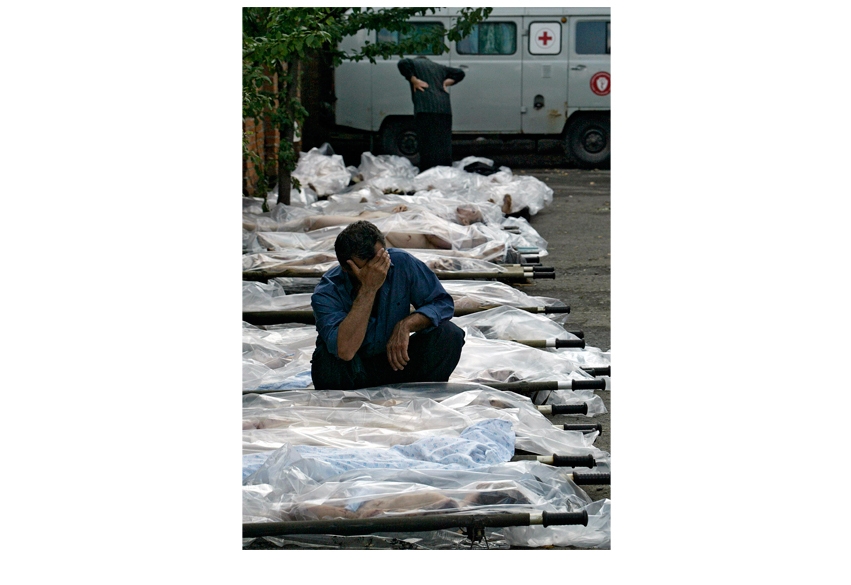The mirrored sunglasses worn by Putin on the cover of Angus Roxburgh’s The Strongman give the Russian president the look of a crude mafia boss, while the half-face photo on the cover of Masha Gessen’s book makes him appear both more ordinary and more sinister. This hints at the difference of the authors’ approach.
Gessen focuses on the trajectory of a postwar Soviet boy growing up in a shabby communal flat, fierce and vengeful in street fights, who dreams of joining the KGB. This dream was fulfilled: Putin got a boring job as an agent in East Germany, and ten years after returning home he surprisingly became the most powerful man in Russia — which, 12 years later, he remains.
His years in the KGB taught him secrecy. And when he was ‘catapulted to power from obscurity’, as Gessen puts it, he was able to use that experience to control information about himself and create his own myth. Gessen’s initial task was to unearth Putin’s past deeds from the darkness that enveloped them. Then her job became even more difficult, for as a public figure he had that much more to hide.
She is able to shed some light on his activities as deputy mayor of Petersburg, thanks to a detailed interview with Marina Salye, a former city councillor, who in 1992 launched an investigation into the notorious ‘raw materials in exchange for food’ scheme which never provided any food for the city. Her report concluded that in his capacity as Head of the Committee for Foreign Relations Putin had entered into contracts of questionable legality and pocketed all the profits from the sale of public resources. Mayor Sobchak’s support of his deputy ensured that the report did not go far. Salye published some of her findings just before Putin’s election in March 2000 in an article entitled ‘Putin is the President of a Corrupt Oligarchy’, then went into hiding and disappeared from public view for more than a decade.
Gessen tries to analyse what has lain behind Putin’s decisions in some of the scariest events of the last decade — for instance, the Kursk submarine disaster, the Dubrovka theatre siege and the Beslan school crisis, in all of which lives were unnecessarily sacrificed. She does not doubt that for Putin security regulations take precedence over any other consideration — which is why foreigners offering help were not allowed to board the submarine, and Russian doctors were not given the name of the gas used by troops in the theatre siege. This was supposed to remain a secret.
Similarly, while Putin’s nature and upbringing made it impossible for him to negotiate with the hostage-takers at Beslan, sending troops to storm the building at the cost of 338 lives presented no problem for him. This disregard for human life can be traced directly to his KGB origins, and it is this mindset, rather than simple greed, dishonesty or vindictiveness that Gessen believes explains his other actions:
He put Khodorkovsky [once the richest businessman in the world] behind bars for the same reason as he abolished elections or had Litvinenko killed: in his continuing attempt to turn the country into a supersize model of the KGB, where there can be no room for dissidents or even for independent actors.
Gessen’s dispassionate, dry style does not hide her moral outrage at what has been happening in her country.
It is very different for Angus Roxburgh. His book also contains detailed accounts of the hostage crises and assassinations; he too talks about the curtailment of democratic freedoms, and — unlike Gessen — about Putin’s foreign policy, but without the slightest hint of indignation. Even when he criticises Putin, his tone is that of amusement. ‘Putin’s Tongue Lets Him Down Again’ is how he describes the president’s obnoxious reply (‘If you want to become an Islamic radical and have yourself circumcised, I invite you to Moscow’) to the correspondent from Le Monde who dared to question him about Chechnya.
The slightly familiar tone can be explained by Roxburgh’s three-year stint working for the American PR-firm Ketchum to improve Russia’s image abroad. And although Putin may not have listened much to Roxburgh, the reverse definitely seems to have applied. Roxburgh echoes the Kremlin line in portraying Yeltsin’s era as ‘a decade of shame and humiliation’; and he dodges discussion of allegations like Salye’s with such bland comments as ‘Putin’s tenure as deputy mayor was not without controversy’.
His indignation is reserved for others: mostly for Americans, whose ‘insensitivity’, he asserts, is no better than ‘Putin’s stridency in pursuing his legitimate goal of restoring Russian pride and status’. He attacks Bush who, on a visit to Latvia in 2005, ‘sided fully with that Baltic nation’s interpretation of postwar history — namely, that the … Soviet army had … become an occupation force’. Bush is deemed insensitive, because this is ‘a truth the Russian government finds very hard to stomach’ — which, according to Roxburgh, means the Kremlin’s anger justified. What infuriates the Kremlin, and Putin personally, even more are remarks concerning the present imperial ambitions of Russia or the lack of democracy in the country. It is here that Westerners stand accused of ‘interference with Russia’s internal matters’ or ‘lecturing Russia’.
In reality, as Gessen confirms, apart from a few timid attempts at mild criticism, western governments on the whole have appeared oblivious to Putin’s numerous crimes against humanity. Even today, when tens of thousands of Russians are protesting against the illegitimacy of the recent elections, Western leaders have been eager to congratulate Putin on his unlawful victory.
They seem to be following the advice addressed to the West by the former British ambassador to the Soviet Union Sir Rodric Braithwaite, which Angus Roxburgh quotes sympathetically on the last pages of his book: ‘The rest of us are better employed in keeping our mouths shut’. There is nothing Putin would like better.





Comments